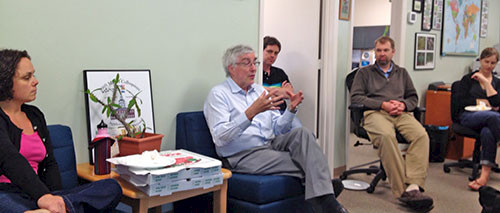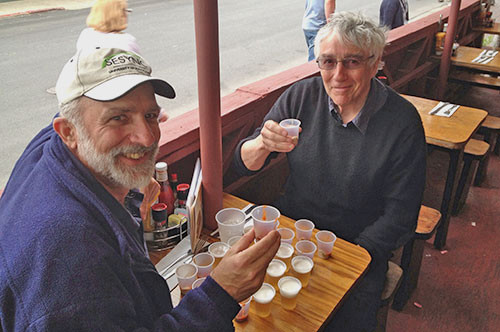Paul Greenfield: A human catalyst
Bill Dennison · | Applying Science | 1 commentsProfessor Paul Greenfield was my mentor both at the University of Queensland and in the Healthy Waterways campaign. Paul recently retired from his role as Vice Chancellor of the University of Queensland and I would like to provide my perspective on his role as a human catalyst.
Sometimes the most difficult thing to measure is the most important thing, for example, the action of a catalyst is absolutely critical for a reaction to take place, but it is difficult to measure. In a chemical reaction, there is a conversion of starting materials (reactants) into new materials (products). In order for the reactants to become products, a catalyst is needed. The action of the catalyst is to facilitate the reaction, not to become part of the reaction. While it is fairly straightforward to measure the disappearance of the reactants or the accumulation of the products, the catalyst does not dissipate during the reaction like the reactants, nor does it accumulate like the products. The role of the catalyst is much more subtle to discern. The catalyst in biochemical reactions is a type of protein called an enzyme. The catalyst in the human reactions is a type of academic catalyst and Healthy Waterways catalyst called Paul Greenfield.
When it comes to catalyzing human activities, the enzyme (Paul) needed to attract reactants (people ready to be transformed), provide the right conditions (reward systems, opportunities), inject significant amounts of energy (emotional and intellectual energy) and turn them into products (transformed people). The transformation of people means that they become empowered, and many of them do not even recognize the action of the catalyst. From the outside, the observation is the transformed and empowered people, not the catalyst.

Having observed firsthand the catalytic action of Paul Greenfield, I conclude that the University of Queensland would not be the academic powerhouse that it has become, nor would the Healthy Waterways campaign have become the model system for environmental management without Paul Greenfield. The reactions simply would not have occurred. It is difficult to imagine what might not have occurred in the absence of a catalyst, but there are multiple examples of organizations and communities that have not been transformed. What makes the University of Queensland and the Healthy Waterways campaign unique is that real and fundamental change occurred, catalyzed by Paul Greenfield. The former premier of Queensland, Peter Beattie, recently said that Queensland would not have become the 'Smart State' without Paul Greenfield. That is a powerful testimony to Paul's far ranging influence.
Unfortunately, one of the symptoms of Australian insecurity as a latecomer to the British Commonwealth, and a convict origin, is known as the 'Tall Poppy Syndrome'. In this scenario, individuals deemed to rise above the pack are actively clipped back, rather than celebrated for their relative success. In the case of Paul Greenfield's career, the 'Tall Poppy Syndrome' was manifested by a series of newspaper attacks which resulted in Paul retiring from the University of Queensland earlier than planned. The hastened retirement actually could benefit Paul's health and his replacement, Professor Peter Hoj is a worthy successor. What I find disconcerting is that the University of Queensland is not going to be naming buildings, bridges or roads after Paul Greenfield, in spite of his powerful impact. Yet, on reflection, the action of a catalyst is too sublime and difficult for most people to discern. The true legacy of Paul Greenfield will be the transformed people and organizations that he catalyzed. I, for one, will continue to be part of that legacy, and everything that I accomplish will have the imprint of Paul Greenfield.

About the author
Bill Dennison

Dr. Bill Dennison is a Professor of Marine Science and Vice President for Science Application at the University of Maryland Center for Environmental Science.
Next Post > Me and Bobby Twilley
Comments
-
David Randerson 13 years ago
Bill, I've got to say you are spot on. UQ would not be where it is today, let alone Queensland, had it not been for Paul. A highly significant mentor and friend of mine. Although I have not seen Paul for some years, the bottom photo is not the person in the top one. Life can take some sad twists and it is the talented who seem to get the brunt of unfair criticism by the mediocrity - those who are untalented cannot recognise talent. David Randerson.